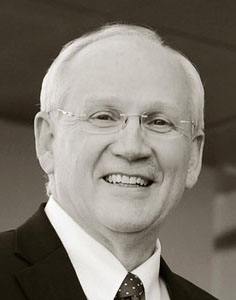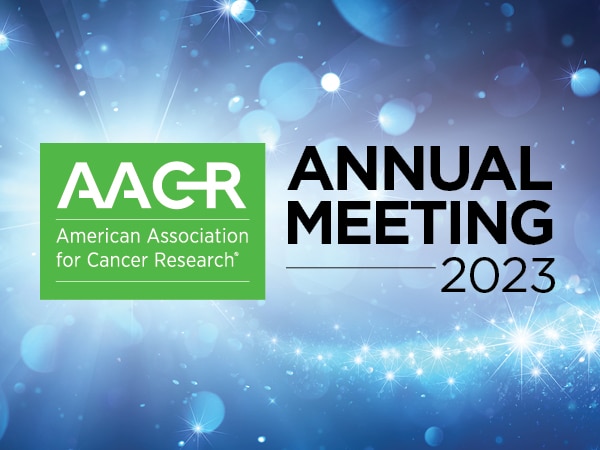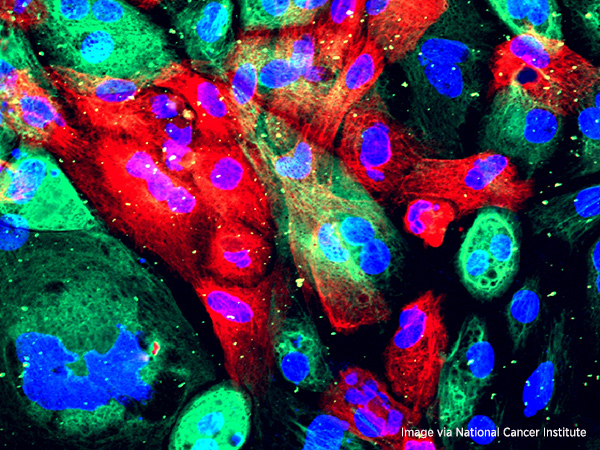Continue the Conversation: Social Media at the AACR Annual Meeting
Guest Post by Raymond DuBois, MD, PhD
Arizona State University Biodesign Institute
Are you ready for the AACR Annual Meeting 2015?
Beginning April 18, more than 18,500 researchers, physician-scientists, survivors, advocates, and others will gather for this must-attend meeting filled with educational sessions, major symposia, forums, and poster sessions featuring the latest and most exciting new discoveries in cancer research. The Annual Meeting sets the research agenda for the cancer community, and I look forward to joining my fellow investigators in Philadelphia.

DuBois shares a scene from the AACR Annual Meeting 2014 on Twitter. In this photo, Scott Lowe, PhD, José Baselga, MD, PhD, and Charles Sawyers, MD, participate in an ABC News Twitter chat on breakthroughs in cancer research, held to coincide with the meeting. DuBois and a number of other attendees joined the chat as well.
I’m excited not just because of the leading-edge cancer science that will be presented, but also because of all the sharing that I anticipate will flood the social web with news of biomedical innovations helping us better understand, prevent, and treat the more than 200 diseases we call cancer.
During the Annual Meeting there will be a surge of interaction at the Pennsylvania Convention Center in Philadelphia and on the myriad social networks including Twitter, Facebook, LinkedIn, and more.
The growth of social media provides valuable venues for collaboration, sharing, and engagement among researchers, clinicians, patients, and advocates that can propel the science further and faster—helping investigators across all disciplines to deliver on the theme of the Annual Meeting by “Bringing Cancer Discoveries to Patients.”
The Annual Meeting is the best place to catch up on the most innovative research that is advancing our understanding of cancer and laying the foundations for new approaches to prevention, better treatments, and cures.
In order to maximize the benefit of the meeting for scientific attendees, the AACR encourages presenters to include new and unpublished data in their presentations. Many presenters, however, are reluctant to share unpublished data out of a concern that future publication in a scientific journal may be jeopardized if those data are widely distributed beyond the meeting.
Each of us plays a role
To ensure that Annual Meeting attendees have access to the latest advances in cancer research, the AACR tries to create an environment in which thought leaders in all disciplines feel comfortable sharing their most current data.
Please don’t jeopardize our colleagues’ hard work and discourage them from presenting their up-to-date data by sharing unpublished data via social media. The AACR prohibits photography in the session rooms and the sharing of unpublished data for this important reason, but ultimately it is a matter of collegiality and professional integrity.
Collaboration is critical to science and social sharing can further collaboration. However, capturing, transmitting, or redistributing your colleagues’ data during the conference may preclude future publication and compel others to be less willing to include their high-impact data in the future. Encouraging the presentation of these cutting-edge data is the best way to push forward the science that is at the heart of the Annual Meeting and the other scientific conferences and special meetings the AACR holds each year.
Basic, translational, and clinical investigators can use social media platforms to support their research efforts in many ways. Researchers and the public can follow the musings of thought leaders in their field, discover articles of interest from respected colleagues, engage and recruit patients for clinical trials, and create working groups around the topics that interest them.
I am excited about the AACR Annual Meeting 2015, and I look forward to interacting with you in Philadelphia and via the social web as we work together to find innovative ways to prevent and cure cancer.
Raymond DuBois, MD, PhD, is the executive director of The Biodesign Institute at Arizona State University, a research institute engaged in addressing critical global challenges in health care, sustainability, and security. He also holds the Dalton Chair in ASU’s College of Health Solutions with joint appointments in chemistry and biochemistry. In addition, he has a joint appointment with Mayo Clinic, co-leading the cancer prevention program.
DuBois is a past president of the American Association for Cancer Research, and he currently serves as chairman and president of the AACR Foundation. He was elected to the inaugural class of fellows of the AACR Academy in 2013. Follow him on Twitter at @Rndubois.





Thanks for this message and conversation. I’d be happy to chat with your and your leadership on this subject in more detail either at the conference or in a subsequent call.
For more information about the docs on social media. Story here: http://www.healthnewsreview.org/2015/03/social-media-reacts-to-emperor-of-all-maladies/
Thank you both for your thoughtful comments. Please be assured that the AACR shares your goal of improving the lives of patients now. We are dedicated to advancing the science that produces innovative new cancer treatments and cures.
We promote scientific collaboration and sharing among the entire cancer research community, including patients and advocates. Through our Scientist↔Survivor Program, patient advocates attend Annual Meeting sessions with senior scientists to exchange perspectives and experiences for the benefit of both.
We ask that all our speakers share the latest advances from their laboratories and clinical trials with their fellow scientists, patients, and advocates to accelerate translation from the bench to the clinic. We also make nearly 5,900 abstracts related to their oral and poster presentations available free online.
The AACR strongly encourages the use of social media before, during, and after our conferences. The Annual Meeting hashtag (#AACR15) links a vibrant community that will post tens of thousands of messages between now and the close of the Annual Meeting.
The Annual Meeting will also feature a Professional Advancement Session on Social Media for Scientists to demonstrate to meeting attendees the personal and professional benefits of using these platforms. Further, for the second consecutive year, the AACR will be facilitating participation in an ABC News Twitter chat during our Annual Meeting, bringing together hundreds of scientists, clinicians, and patient advocates to share the latest information in cancer research. This chat, scheduled for Tuesday, April 21, is one of five Twitter chats in which the AACR has participated in the past year.
Our commitment to informing patients extends beyond the Annual Meeting. As a production supporter of the #cancerfilm “Cancer: The Emperor of All Maladies,” the AACR has actively contributed to the online conversation about cancer research created by the film. In addition, we publish Cancer Today, a quarterly magazine and online resource for cancer patients, survivors, and their family members and friends.
We appreciate your feedback on our policies. We evaluate these policies every year, and we will present your perspectives to our leadership during that evaluation.
Just want to support David’s call to change the policy. The National Cancer Institute recently convinced 250 doctors to join #cancerfilm on Twitter to open up #patient + doc communication. Believe @AACR should join.
Thank you for spotlighting this, David, and thank you to Sally James at PatientsLikeMe for tweeting about it.
I want to draw attention to the reality that one of the key inhibitors that keeps medicine from achieving its potential is slow dissemination of new knowledge, and this can have immediate harm to patients.
For the moment I’ll set aside David’s observation that social media snapshots are not the issue; we’re still left with an honest and vital ethical question: do we want to put a higher priority on the researcher’s publication prospects than on the lives of patients whose clinicians are not yet aware of vitally important new information?
I know that the pre-2000 view of that is “Huh?? We get it published as fast as we can.” But “Doc Tom” Ferguson, founder of the e-patient movement that became the Society for Participatory Medicine, cited what he called the “lethal lag time” between the birth of new knowledge and its arrival in the clinic. Engaged, empowered patients often nullify that lag time by being highly motivated “mutual life-savers” to each other, finding and sharing information.
For more about this see the boxed anecdotes and the illustrations in my February BMJ article “From patient-centred to people powered: autonomy on the rise.” http://www.bmj.com/content/350/bmj.h148 Consider, for instance, the case cited in that article of Janet Freeman-Daily, who was at an excellent cancer center yet still helped her case by finding information in an online patient community.
I should note, too, consistent with David’s comment about other conferences – this is not a new issue; ACCR may want to consider that it’s already reached maturity and acceptance elsewhere in oncology, so they may not want to be caught behind the curve: Three years ago at ASCO 2012 I (a mere cancer patient with a bachelor’s degree) co-presented an article about social media and oncology, with co-authors Dr. Jack H. West and Dr. George Margelis http://meetinglibrary.asco.org/EdBook?vmview=edbk_detail_view&confID=114&abstractID=169
Neither that article nor Freeman-Daily’s case is apples-to-apples with the issue at hand here, but the reality is that the world has changed, and policies that are aligned with the pre-change world may be substantially inhibiting a conference’s value to modern thinkers. I respectfully urge the AACR to think about the ethical question above, and to think about its position relative to other events. Thank you for your consideration.
Thanks for your reply. One item deserves clarification because I believe it is at the heart of AACR’s atypical stance on social media and photos for personal use.
“Distribution online” is not the action that might jeopardize the ability to obtain publication. Most publications ask whether the work has been published or presented previously. The act of showing a poster or a slide deck at the AACR meeting is the prior presentation/publication that may interfere with acceptance. It’s NOT whether someone subsequently tweets data.
In conversations with staff at other scientific organizations, understanding this nuance was important for their determination to modify their social media and photo policies. Once this nuance was accepted, the decision to improve sharing of information among researchers to improve patient outcomes was easier.
Thanks for considering this viewpoint.
AACR is well behind all other oncology conferences in social media. It’s refusal to update its anachronistic policies on data sharing and photos for personal (note-taking) use are an embarassment.
For a decade, scientists presenting cutting-edge data at ASCO have managed to get published even though photos for personal use have been allowed. For years, ASCO has encouraged social media sharing of data with no meaningful effect on the ability to publish — even though much of the data presented at ASCO are preclinical, unpublished works.
Same for the American Society of Hematology meeting.
Same for the American Urological Association meeting.
Same for the San Antonio Breast Cancer Symposium (ironically co-sponsored by AACR).
Same for all the ASCO disease-specific symposia.
If a scientist brings data to AACR, those data are ‘published’. Snapping a picture instead of laboriously handwriting notes or sharing a 140-character summary of the highlights on Twitter does NOT alter this. The data are already shared in poster display or the oral presentation at the meeting. No additional harm will come to any presenter due to personal photos or Tweeting.
That does not mean there is no harm in AACR’s policy, however. By stifling the ability for researchers to easily share information, AACR’s policies harm patients. Rapid advancement of cancer treatments require collaborative efforts. The whole POINT of scientific conferences like the AACR Annual Meeting is to share data with other researchers, after all. I’ll say that again because it is crucial…
The whole POINT of scientific conferences like the AACR Annual Meeting is to publicly share data with other researchers.
I strongly encourage AACR to revisit its social media and personal photography rules, modernizing them to match those of other large oncology meetings. The current policy make no logical sense and, worse, hurts patients by depressing crucial sharing of information among the oncology research community.
Thank you for your comment. At the AACR, we encourage scientists, researchers, advocacy groups, members of the news media, pharmaceutical and medical companies, and others to take part in social media conversations during the AACR Annual Meeting.
As Dr. DuBois explains in his post, we endeavor to create an environment at our scientific meetings in which presenters feel comfortable sharing their most current, often unpublished data. Our social media policy for the AACR Annual Meeting is in place to encourage scientific collaboration and sharing while at the same time protecting our colleagues’ innovative research that they may seek to publish in a scientific journal. If our presenters’ unpublished data is distributed online, it could jeopardize their ability to obtain publication.
The current social media and photography policies will remain in effect for the AACR Annual Meeting 2015. We review our policies and procedures after every Annual Meeting and welcome feedback from all attendees.